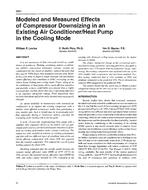
3981 — Modelled and Measured Effects of Compressor Downsizing in an Existing Air Conditioner/Heat Pump in the Cooling Mode
- Comments Off on 3981 — Modelled and Measured Effects of Compressor Downsizing in an Existing Air Conditioner/Heat Pump in the Cooling Mode
- ASHRAE
A used, 15-year-old, single-package heat pump with a capillary tube expansion device on the indoor coil was purchased and tested in a set of environmental chambers to determine its cooling performance under various conditions. The system was also modelled to estimate its existing performance both before and after being retrofitted with a new state-of-the-art (SOA) compressor with about 30% less capacity than the original compressor. This reduced the overall system cooling capacity by about 20%. Modelling estimated that the retrofit would increase the system’s energy efficiency ratio (EER) at 95degF (35degC) by 30%, increase the seasonal energy efficiency ratio (SEER) by 34%, and reduce power demand by 39% compared to the existing unit. Reduced cycling losses account for the higher increase in SEER. The proper refrigerant charge of the as-received unit – determined using superheat, operating pressures, and EER as guidelines – was 22% higher than the nameplate charge. After testing, the existing compressor was replaced with one of the 30% smaller SOA compressors that had been modelled. Further testing confirmed that a 33% increase in EER was attained, compared to the predicted 30%. Power demand was reduced 38% compared to the predicted 39%. States that the surest way to obtain a proper refrigerant charge on the unit was to use a set of gauges coupled with superheat measurements.
KEYWORDS: year 1996, calculating, measuring, comparing, compressors, unit air conditioners, performance, oversizing, sizing, heat pumps, performance, modernising.
Citation: ASHRAE Trans. 1996, Vol.102, Part 2, Paper number 3981, 22-33, figs., tabs., refs.
Product Details
- Published:
- 1996
- File Size:
- 1 file , 1.6 MB
- Product Code(s):
- D-16345

